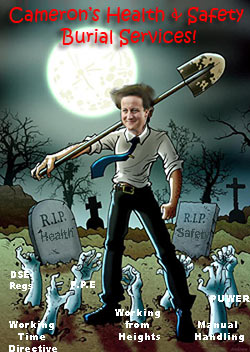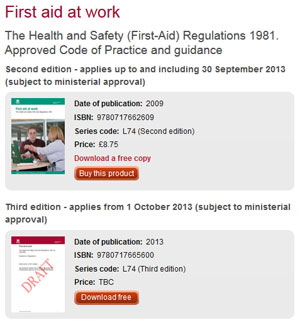One of the first ACoPs associated with Health and Safety legislation is being withdrawn in October as the Tory-led coalition government dismantles over 40 years of workers health and safety protection.
 Instead three (yes 3!) guidance documents will be provided by the HSE, making the legislation easier to understand for employers, than the ACoP – according to the government and the HSE!
Instead three (yes 3!) guidance documents will be provided by the HSE, making the legislation easier to understand for employers, than the ACoP – according to the government and the HSE!
Less cumbersome and less numerous health and safety documentation and legislation was promised by David Cameron within 6 months of his coming to power and forming the coalition government with the Liberal Democrats.
First Aid organisations such as St John Ambulance are gearing up for the changes and making advice available to their members and businesses, based on the new regime of anyone being able to provide First Aid training, irrespective of their competency!
It is being left to business themselves to monitor the efficacy of the training that their provider they hire delivers. Given the lack of knowledge of First Aid amongst managers and business leaders; it is very unlikely that standards in First Aid training will not diminish.
St John Ambulance explain the changes on their website:
Due diligence: Choosing the right first aid training for your workplace
The proposed regulation changes allow employers greater freedom in choosing a training provider and qualifications to meet their identified first aid needs. The HSE proposes that, when choosing a training provider that isn’t a Voluntary Aid Society (eg. St John Ambulance) or a registered centre of an Awarding Organisation, employers will be required to undertake due diligence of the provider to ensure that the appropriate standards are met.
What should due diligence of a training provider include?
When undertaking due diligence of a training provider, there are several things to check:
- Trainers hold recognised teaching qualifications
- Trainers have relevant first aid knowledge
- Trainers are quality assured
- Training follows the latest approved first aid protocols
- There is a documented complaints procedure in place
- Details of topics covered on the course
- Existence of a documented course evaluation procedure
- Assessors are appropriately qualified.
Currently, both the ACoP and First Aid guidance documents from the HSE exist, but both the ACoP and the existing guidance document L74 version 2 will be withdrawn on 1st October.
Both the ACoP and L74 will be replaced with a new 3rd edition of L74 (written last February) on 1st October 2013, and the HSE have provided for free download, a draft copy of the revised L74 guidance effective then.
The HSE, on their website explain the main differences in the 3rd version of the guidance document(s):
“This publication has been updated to take account of the amendment to regulation 3(2), which removes the requirement for HSE to approve the training and qualifications of appointed first-aid personnel, and to incorporate some additional amendments brought about by other previous legislative changes.
HSE's move away from the approval of training and qualifications has meant that associated guidance has been updated and strengthened specifically to assist employers in their selection of first-aid training providers.
These changes were made following a recommendation from 'Reclaiming Health and Safety for All: An independent review of health and safety legislation', by Professor Ragnar E Löfstedt, which was published in November 2011.”
 In going into detail, the HSE advise:
In going into detail, the HSE advise:
“From 1 October 2013, if the amended Regulations come into effect, the guidance in the third edition of L74 will apply. A draft version of the third edition is available for download, or you can order a printed copy, which will be despatched after 1 October. Please note that if you download a copy before 1 October, the draft may be subject to further change before the third edition comes into effect.
This guidance is for employers. It sets out what employers need to do to address first-aid provision in the workplace.
It provides guidance on:
- managing the provision of first aid (first-aid kit, equipment, rooms etc)
- requirements and training for first-aiders
- requirements for appointed persons
- making employees aware of first-aid arrangements
- first aid and the self-employed
- cases where first-aid regulations do not apply
The publication is aimed at all industries, although specific guidance on first aid in mines, offshore, and diving is covered in separate publications.
All three draft documents has been added to the E-Library Database and can be downloaded by using search category ‘First Aid’
Source: HSE / Unionsafety / St John Ambulance


 Instead three (yes 3!) guidance documents will be provided by the HSE, making the legislation easier to understand for employers, than the ACoP – according to the government and the HSE!
Instead three (yes 3!) guidance documents will be provided by the HSE, making the legislation easier to understand for employers, than the ACoP – according to the government and the HSE!